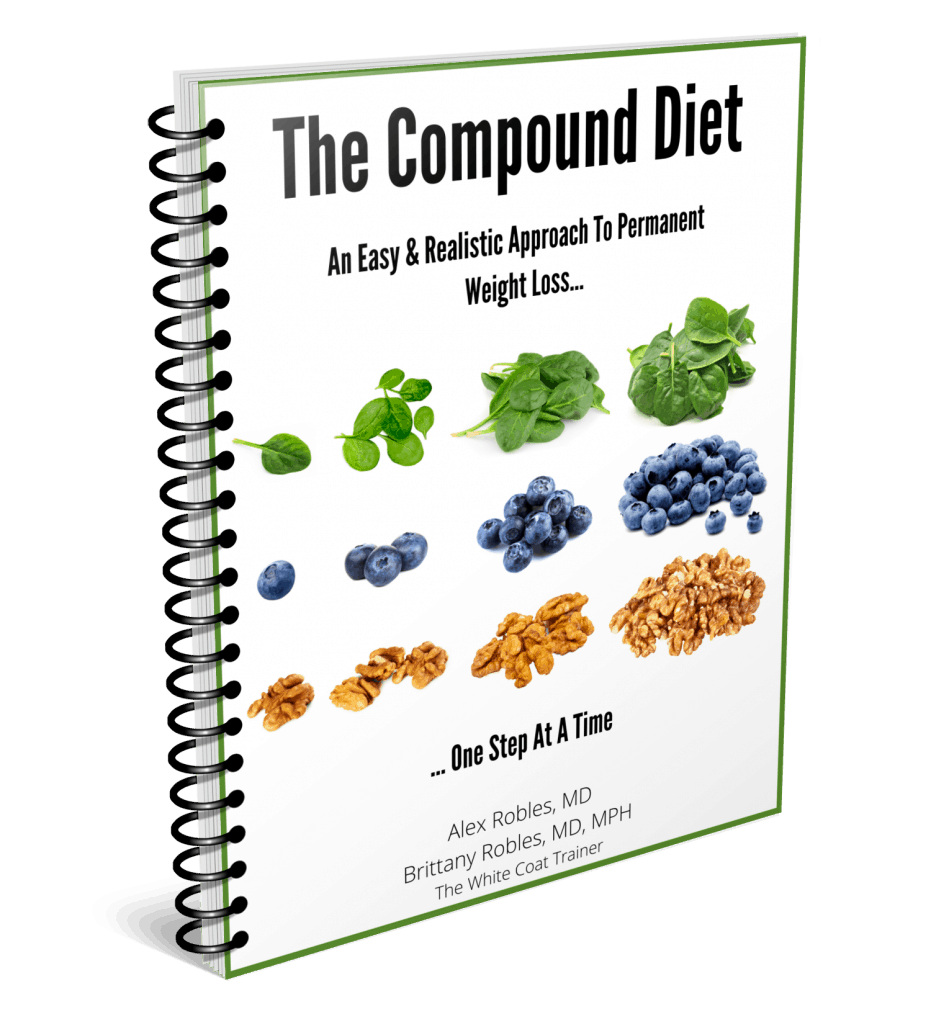Do you feel like you’ve tried everything but you can’t lose weight no matter what?
Maybe you started an exercise program, only to stop working out a month later.
Or maybe you started a diet, but you couldn’t stick with it.
You’re not alone.
Staying consistent with a fitness routine is the biggest struggle many people face.
After reading this post, you’ll learn why you can’t lose weight no matter what, and what you can do about it.
Keep reading.
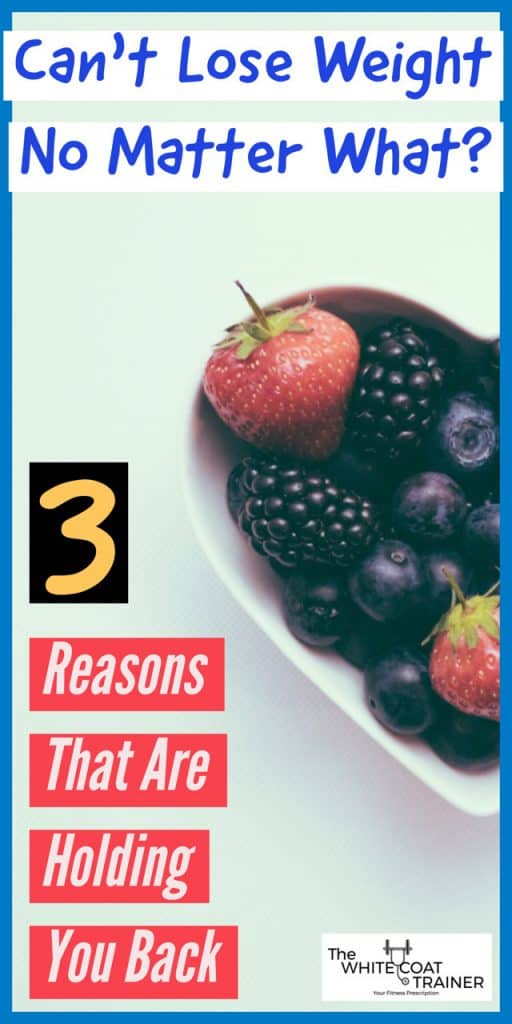
Why Can’t I Lose Weight?
From a scientific perspective, weight loss is fairly simple. You need to get your body to burn off excess energy.
From a practical perspective, weight loss is fairly challenging.
There are dozens of social, cultural, environmental, and physiologic aspects involved with losing weight that we often fail to address.
Let’s start by listing out the top three reasons.
Reason #1: The Weight Loss Industry
Whenever there is profit to be made, the masses tend to get exploited.
Sadly, this is extremely prevalent in the weight loss space.
Have you noticed that the weight loss industry is always selling you an amazing new supplement or promoting a new diet?
Why is there always a new magic pill, or a new way of eating?
Surely, if what they promoted actually worked, obesity rates would be dropping.
Instead, the opposite is happening. Obesity rates are climbing despite people spending more money on weight loss. [1]
Rather than acknowledging that their methods don’t work, the weight loss industry puts the blame on you.
You’re told that you lack motivation or willpower.
You see, it is much more profitable to keep you from achieving your goals than it is for you to be successful. That way, you can be a repeat customer for life.
But there’s good news.
You don’t need any of their diets or their fad supplements.
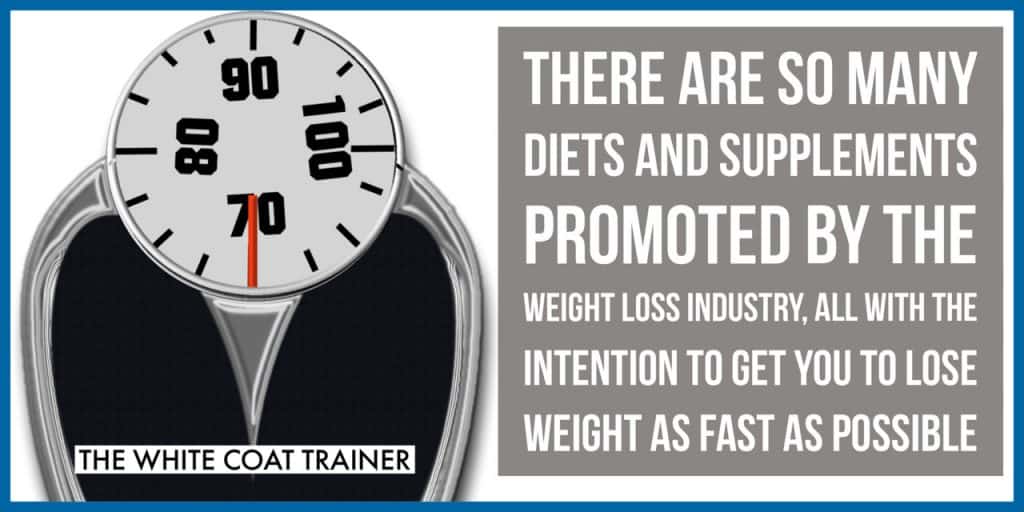
That’s reason number one.
Reason # 2: Metabolic Adaptations
Anyone who has ever tried to lose weight knows how difficult it can be.
Sometimes it feels like your body is fighting against you.
Believe it or not, it is.
There is a phenomenon known as ‘metabolic adaptation’ that happens any time you go on a diet.
Let me explain.
Your body is designed to do two things, survive and reproduce. It doesn’t care about diets, and it certainly doesn’t care about fat loss.
In fact, your body sees weight loss as a threat to its survival.
Why?
Because humans have evolved to store fat. Fat is like a savings account. It is stored energy that is locked away, only to be used in times of need.
You see, humans didn’t always have access to “unlimited” sources of food like we do today. So, we had to find a way to store energy away when food wasn’t readily available. So having some fat on your body was always a good thing.
It’s basic evolution.
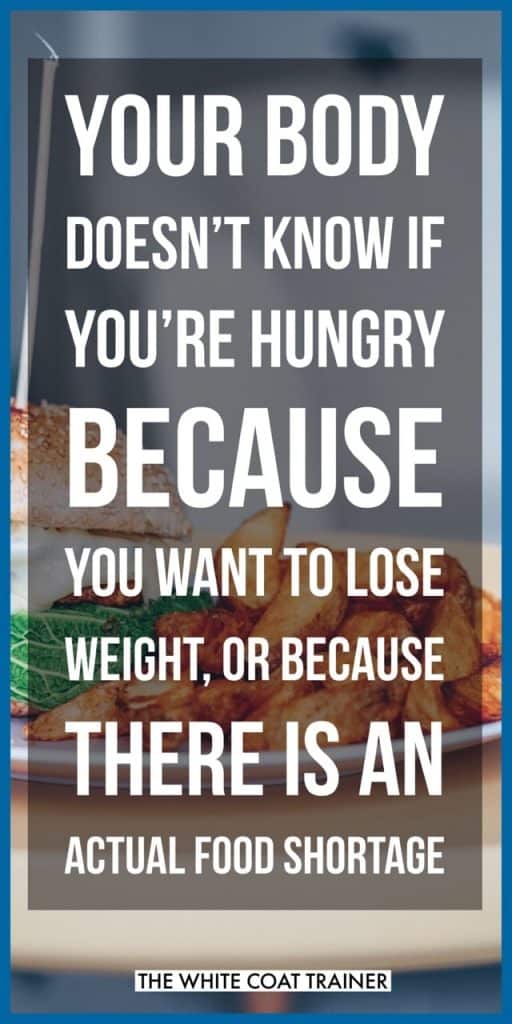
So what is metabolic adaptation?
It’s what happens when you go on a diet and you drop your caloric intake.
Your body turns on the signals that indicate that there is a “food shortage” and survival mechanisms kick into play.
The first thing your body does is slow down your metabolism which helps conserve energy. [2] [3]
This means you will begin to burn fewer calories doing everyday things.
That’s not the only thing your body does.
It also decreases the release of leptin (a hormone responsible for indicating satiety) and increases the release of ghrelin (a hormone responsible for increasing hunger.) [4]
This is to get you to eat more calories and restore your fat levels back to baseline.
Lastly, your body increases lethargy, making you less likely to exercise and be active.
So yes, your body doesn’t want you to lose fat.
Thankfully, all hope is not lost.
I’ll show you how to combat these adaptations in a little bit.
First, let’s discuss the third reason why you can’t lose weight.
Reason #3 Yo-Yo Dieting
The final reason why losing weight is so difficult is because you are yo-yo dieting.
Yo-yo dieting is exactly what it sounds like.
You diet for some time, lose weight, then go off the diet, regain the weight that was lost, then go back on a diet… and so on.
Has this happened to you or anyone you know?
It is a perpetual cycle of fat loss and fat gain.
While this may not sound like a big deal- every time you do this, you are actually shooting yourself in the foot.
Remember the metabolic adaptation we just spoke about?
Well, your body is pretty sophisticated at adapting to whatever you throw at it.
Since it sees weight loss as a bad thing, your body builds resistance to weight loss in the future. [3]
In other words, your body becomes better at defending itself against losing fat.
This explains why it’s so difficult to lose weight again in the future if you’ve already seen success in the past.
There’s also evidence to suggest that your body creates new fat cells in response to prolonged hunger. This makes you more prone to weight gain after you come off the diet. [5]
That’s why traditional diets that last for 30 days, 60 days or even 6 months might actually be doing more harm than good.
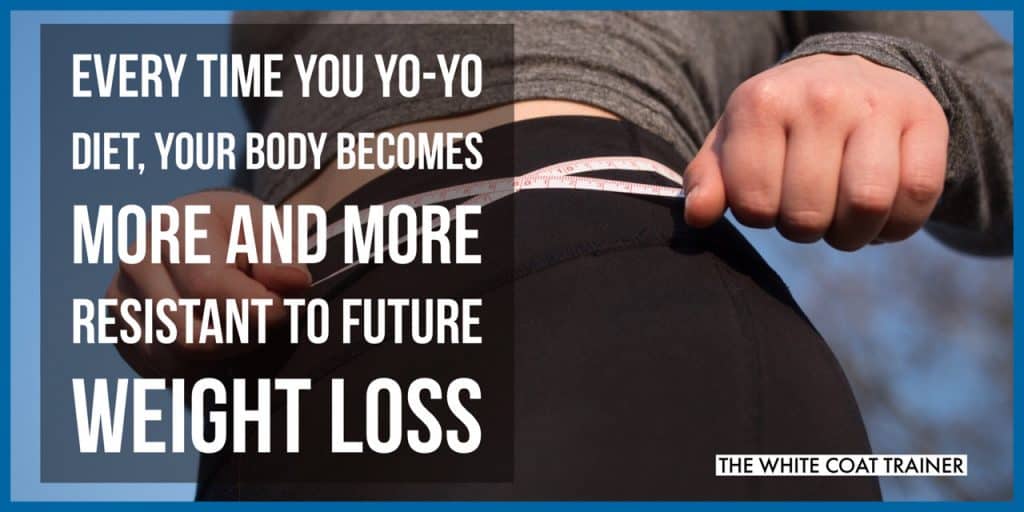
But again, I have some good news.
All you need to do is stop yo-yo dieting and find something that you can stick to long term.
But first, let’s discuss medical conditions that can actually prevent you from losing weight.
Medical Conditions That Can Stop You From Losing Weight
Before starting a weight loss journey, it is always important to see a qualified health care provider first.
If you are struggling with your body weight, you may have a condition that requires medical attention.
The four most common conditions are:
Hypothyroidism:
This is a condition where your body does not produce enough thyroid hormone. Your thyroid is responsible for maintaining all of the metabolic processes in your body.
If you don’t have enough thyroid hormone, your body begins to slow down.
The most common signs and symptoms of hypothyroidism include cold intolerance, fatigue, and weight gain.
It can also lead to some non-specific symptoms such as constipation, lethargy, and mood swings.
Hypothyroidism can be caused by
- An autoimmune condition known as Hashimoto’s Thyroditis
- Radiation treatment near your neck
- Surgical removal of part of the thyroid gland
- Iodine deficiency
A simple blood test can make the diagnosis. If you think you may have hypothyroidism, go see your primary care doctor.
Diabetes:
Unfortunately, diabetes has become extremely prevalent in our society.
It is one of the leading causes of morbidity in the United States due to its vast array of complications.
Complications include:
- Blindness
- Sensory nerve damage that can lead to extremity necrosis
- Kidney failure
- Heart disease
If you are struggling with your body weight (and you have other characteristic signs of diabetes) then it is a good idea to get tested.
Signs of diabetes include increased thirst, increased frequency of urination, and increased hunger.
A random blood sugar test, a fasting blood sugar test, and a Hemoglobin A1c can all make the diagnosis.
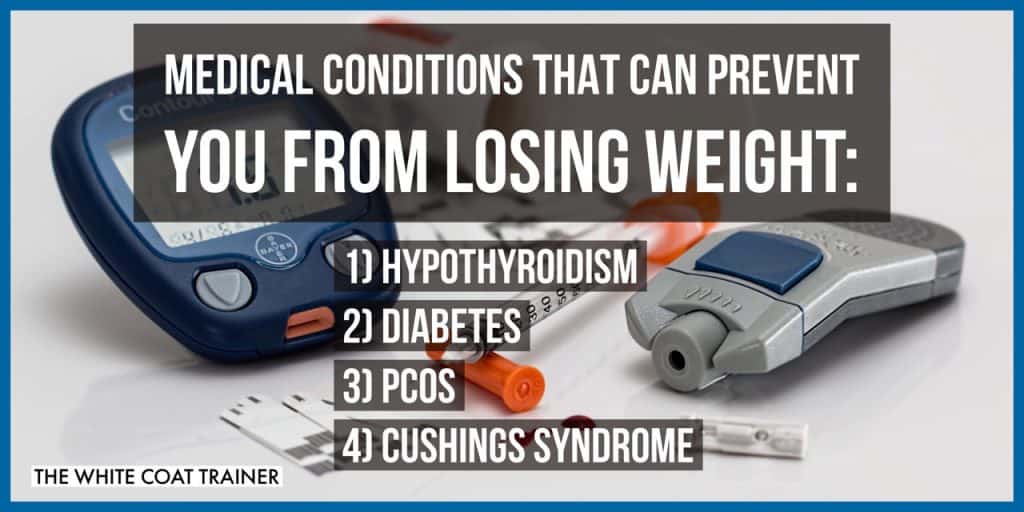
PCOS:
PCOS stands for polycystic ovarian syndrome. It is a condition that develops if you have 2 out of these 3 criteria:
- Irregular periods,
- Multiple cysts seen on an ultrasound of your ovaries,
- Signs of excess androgen such as acne or increased facial hair
PCOS is a condition of hormonal imbalance that we do not fully understand.
Women with PCOS often have high levels of estrogen, which can contribute to weight gain. It also can lead to insulin resistance and metabolic syndrome.
In addition, carrying excess fat will further increase your estrogen levels, worsening your hormone profile even further.
A qualified gynecologist can help you manage this condition.
Cushing’s Syndrome:
Cushing’s syndrome is a condition in which your body has very high levels of cortisol. This can be caused by a tumor, or from exogenous steroid use.
People with Cushing’s disease have an increased risk of obesity, insulin resistance, and other metabolic abnormalities.
Cushing’s can also be diagnosed with a blood test.
If you think you may have one of these conditions, be sure to seek medical attention right away.
They may be contributing to your inability to lose weight.
Okay, now let’s move on to some weight loss strategies that work (provided you have clearance from a qualified health care provider).
The Three Things You Need To Lose Weight
In order to lose weight, there are three things you need to take into consideration.
First, you need to be mindful of the energy balance equation, which is:
Calories In Vs Calories Out
In essence, you need to consume fewer calories than your body burns. This is fairly common knowledge and the advice that most people follow.
To oversimplify the concept: it basically states that our bodies are subject to the first law of thermodynamics.
If you eat more calories than your body needs, your body will take the excess energy and store it as fat.
If you eat fewer calories than your body needs, you will lose weight. Your body makes up the caloric deficit by dipping into the stored energy located in fat cells.
But of course, it’s not always this simple.
If you focus only on calories, you will lose weight. But that’s not the only thing you should take into consideration. The actual composition of those calories matter.
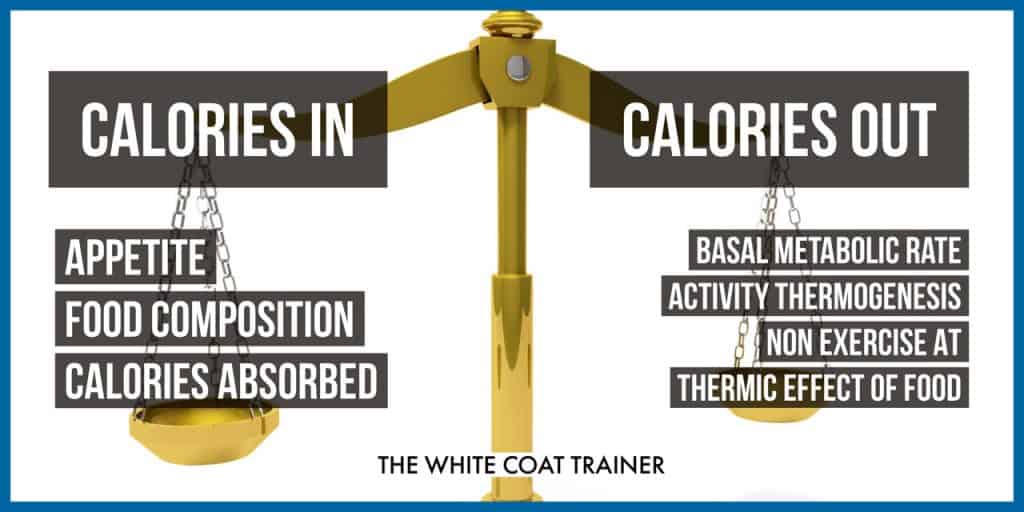
That leads us to the second point.
You Need To Consume Foods That Promote A Healthy Metabolic Environment
Do you think that eating 2000 calories of milkshakes and Dunkin Donuts will have the same effect on your body as eating 2000 calories of a salad, avocados, and berries?
Of course not.
Different foods of equal caloric value can have a different impact on your hunger, your energy levels, and your metabolism.
That’s why it’s important to reduce your consumption of processed foods as much as possible.
Rather than taking food away from your diet, start by adding high-quality nutrient-dense foods to your daily regimen.
Rather than eliminating food groups completely, find a way to choose a slightly healthier alternative.
Every time you sit down to eat something think to yourself:
How can you make this meal healthier?
Can you add something that contains fiber? Can you have a piece of fruit on the side? What about a vegetable?
Can you drink water instead of juice or soda?
It really is that simple.
Now let’s talk about the third and most important factor.
You Need To Find A Routine You Can Stick To
Statistics show that a whopping 80% of dieters regain most or all of the weight they lost within 2-5 years. [3]
They also show that half of gym memberships go unused.
It seems that starting a diet or a new fitness program isn’t the most difficult part for many people. Maintaining the routine is where a lot of people struggle.
Why do you think that is?
Do they lack motivation?
What about willpower?
If you didn’t already know, motivation is a horrible way to stay consistent with anything.
Motivation is an exhaustible resource. Some days you’ll have it, other days you won’t.
A diet or a weight loss journey doesn’t work that way. You can’t follow the diet on some days, and not on others.
If you rely only on your motivation or willpower, you can bet your last dollar that your diet won’t last.
That’s the first reason why a lot of diets and fitness routines fail.
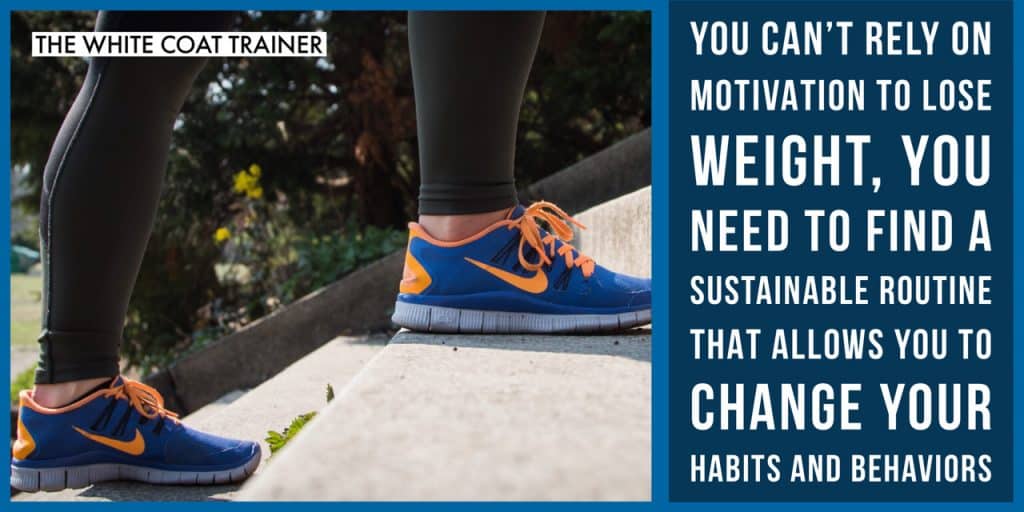
The second reason has a lot to do with the actual routine that you are following.
Why Most Diets & Workout Routines Are Destined To Fail
The most common reason why diets fail is that they do not respect the principle of sustainability.
For example, let’s say you are trying to lose weight via cardio and dieting.
More often than not, you begin a very intense cardio workout regimen and train really hard right from the onset.
You’re so excited, you run several miles on the first day, or spend over two hours on the stair-master machine. You figure that you can’t go home unless you had a “good” workout right?
The end result is a lot of calories burned, and a sense of euphoria from working out so hard.
Similarly, when starting a new diet, you often go ‘all-out’ and revamp your entire eating pattern on the first day.
You make a drastic change from what you are used to eating. You go from eating anything and everything to eating an apple for breakfast, a salad for lunch, and you skip dinner.
Again a few days of this will give you a strong sense of accomplishment and discipline.
The excitement of starting a new routine encourages you to give it yours all from day one.
Unfortunately, these diets and routines are destined to fail right from the beginning.
Why?
Because they simply aren’t sustainable.
Unsustainability Is The Biggest Reason Why You Can’t Lose Weight
When it comes to fitness, your body is quick at adapting to the stimulus provided to it.
Let me explain:
After a few weeks of running those long-winded miles, this stimulus will stop eliciting productive changes in your body.
Plus, these drastic regimens could cause more harm than good.
If your body isn’t used to running for long periods of time, you will quickly begin to feel worn out. Your body was not prepared to do so much work so quickly.
But just for the sake of argument, let’s say that you handled running those 5 miles a day fairly easily.
Your body will soon adapt, and these 5 miles will no longer produce a sufficient stimulus for growth.
Where do you go from here?
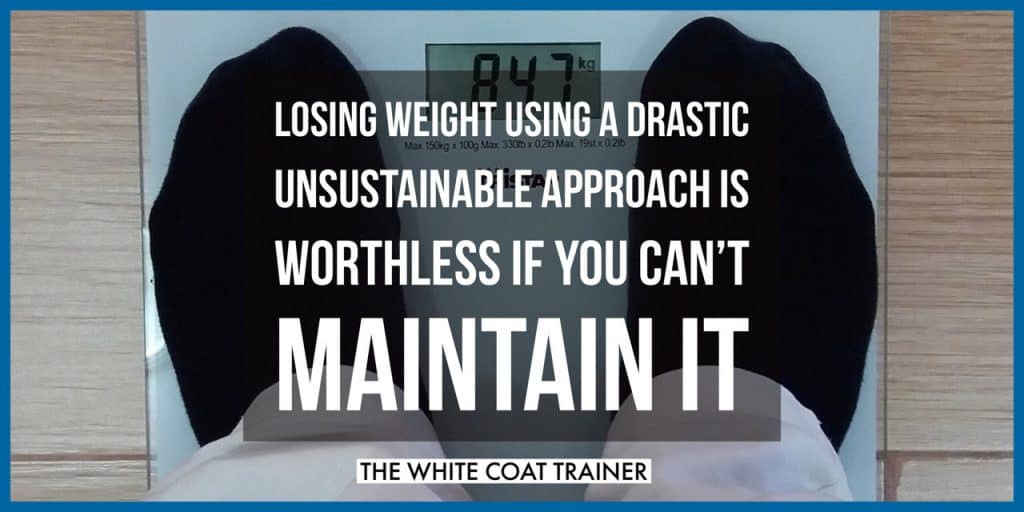
The Downward Spiral Of Failure
In order to keep progressing, you must either increase the volume of the stimulus, (run 5.5 miles) or the intensity (run 5 miles in progressively less time).
In terms of dieting, you will see weight loss following that overly restrictive diet, but eventually, your body weight will plateau.
Now, what do you do?
You can either consume fewer calories or burn more calories.
In both examples, your body will eventually adapt to the new stimulus and plateau again. In order to continue making progress, you will need to increase the stimulus yet again.
Because you started at such a high level from day one, you left little room for improvement.
You can only work out for so long, and you can only eat so little calories before you throw in the towel.
As you can see, this is a downward spiral as this approach is unsustainable.
The strong motivation that encourages you to train to your limits and eat on day one is the same reason why most intense diets and workout regimens fail.
The Insanely Simple Solution To The Problem
So, how do we avoid the trap of creating an unsustainable weight loss routine?
It’s pretty obvious.
You must create a sustainable routine.
To be sustainable, your routine must follow one principle. It must implement slow progressive changes that increase incrementally.
By changing the stimulus in a controlled manner, you allow your body time to adapt to the changes.
At no point is your homeostasis disrupted by a large degree.
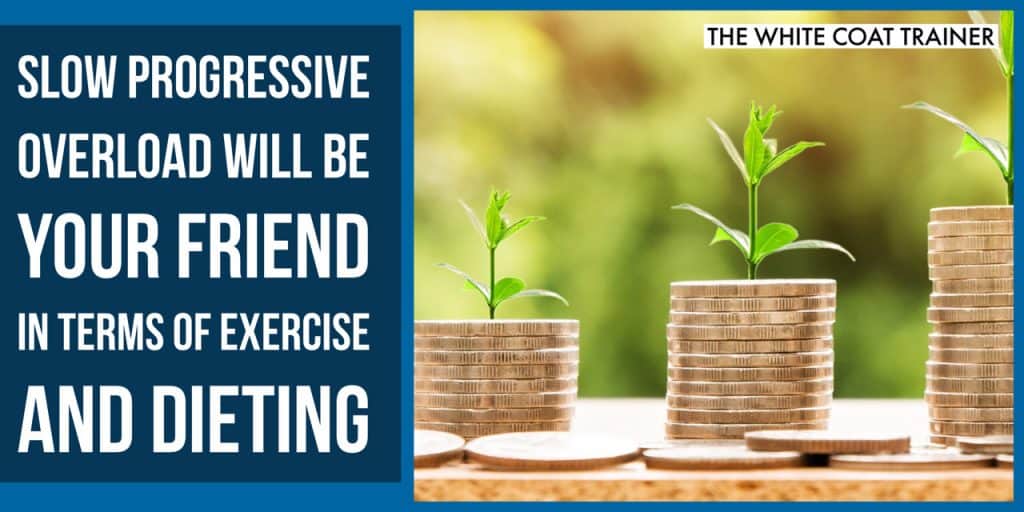
This means that you should start small, and progress slowly. Begin with light workouts and small dietary changes which are both easier to accomplish physically and mentally.
For example, instead of running 5 miles on your first day, you can start with a simple 10-15 minute run at a moderate pace.
Heck, just walk if you need to.
You won’t burn anywhere near as many calories at first, but this approach is far superior for longevity.
There are a multitude of ways to progress this regimen over time. For example,
– you can increase the duration of the walk/run by 1 minute a week,
– increasing the distance you walk/run by 0.1 miles per week, or
– increasing the incline level by 0.5 increments a week.
For weight lifting, you can start by performing 20 total repetitions of each exercise.
The following week, increase the volume by 1 more rep per exercise.
Keep increasing the volume by 1 repetition per week until you accomplish 25 total reps. At that point, increase the weight and repeat.
These are examples of slow progressive incremental changes.
Using this approach, you allow your body to integrate into the new fitness levels slowly. Each time, you create a higher, stronger baseline.
8 Strategies That’ll Help You Focus On Improving Your Health
Okay, so now you understand that you can’t follow drastic unsustainable approaches and expect to lose weight permanently.
You also understand that you can’t rely on motivation to keep you going.
So, what should you focus on instead?
Rather than obsessing over the number on the scale, you need to find small healthy habits you can incorporate into your daily life.
Because here’s the truth.
When you focus on improving your health in a sustainable and systematic manner, weight loss naturally follows.
Here are 9 things you should focus on adding to your normal routine. Remember, add these things slowly to allow your body time to make the adjustment.
Increasing Protein Intake
Protein is the most important macronutrient. It serves as the building block for almost every structure in your body.
It’s also responsible for building and maintaining your muscle tissue, which is extremely important for health and longevity.
In addition, protein is found to have the largest thermic effect of food. This means that your body burns more calories digesting protein than any other macronutrient. [6]
Increasing water intake
We have talked about this before. Water consumption is critical for your health.
Water is necessary for every metabolic reaction in your body. It’s also the only way to stay hydrated, which is important for… just about everything.
If your urine is not a pale yellow color, then you are leaving an easy opportunity to improve your health on the table.
Plus, water can help you…
Decrease your liquid calorie intake
Do you know how many calories are in one serving of soda? What about juice? Or your iced coffee with cream and milk?
These calories aren’t free. They contribute significantly to your caloric budget, and possibly to your waistline.
You don’t have to eliminate these drinks from your diet, but find ways to reduce them, and eventually replace them with water.
![8-practical-tips-to-lose-weight- RATHER THAN FOCUSING ON THE SCALE FOCUS ON 1) Eat More protein 2) DRINK MORE WATER ,3) DRINK FEWER LIQUID CALORIES 4] BALANCE YOUR DIETFOCUS ON IMPROVING 5) EAT FIBER 6) SLEEP MORE 7) WALK MORE 8) STRESS LESS](https://whitecoattrainer.com/wp-content/uploads/2019/12/IMG_3132-1024x512.jpg)
Stop categorizing foods as good or bad
People who lead healthy lifestyles develop healthy relationships with food. They don’t see food as “good” or “bad.”
Rather, they see food as a powerful vehicle to
1) provide their body with nutrients,
2) satisfy their hunger, and
3) as something that brings people together socially
Using this approach, you understand that nothing is off-limits or restricted.
Instead, of saying you can never have pizza again, allow yourself a treat from time to time, while creating a balanced diet.
Consume healthy foods from every major macronutrient the majority of the time.
This way, you create a mindset of abundance, rather than limitations and restrictions.
Eat foods that keep you satiated
One reason why many people find it hard to stick with a weight loss journey is because of hunger. If you focus only on caloric intake, hunger will ensue.
One easy way to bypass this is to consume foods that are voluminous and nutrient-dense. i.e, they occupy a large space in your stomach, while having a low amount of calories.
Just picture it for yourself.
1 Tablespoon of olive oil has 120 calories.
Compare that to 120 calories of broccoli, which is about 3.5 cups!
Which do you think will keep you full?
Fruits and vegetables are on the top of the list of voluminous foods, as well as foods high in fiber.
Getting more sleep
You can’t talk about weight loss without addressing lifestyle factors. Sleep deprivation is closely linked to insulin resistance, chronic stress, and weight gain. [6]
Don’t take my word for it, go check out the research yourself.
Sleep is the equalizer. It is the biggest game-changer of them all.
We have an entire article on simple ways to improve your sleep which you can check out here.
Walking more
It’s no secret that exercise is the key to health, wealth, and happiness. But what you didn’t know is that exercise could be as simple as taking a walk.
We have become a society that has made walking obsolete. We have uber, amazon prime, and seamless to do all of our moving for us.
Thankfully, walking is easy, free, and could be done anywhere. It’s also the easiest way to exercise and burn off some calories.
Make an effort to improve the distance you are walking.
Do it before you go to work, after work, or even on a treadmill.
Even better, get yourself a Fitbit (which I used for 4 years and loved). Right now I use an Apple Watch.
The Apple Watch has been a huge motivator in making me want to exercise even more than I normally do.) If you don’t have one, get yours here.
Do something to decrease your stress levels
The final piece of the puzzle is stress reduction. High levels of stress have also been correlated with weight gain and obesity. [8]
Unfortunately, you don’t always have control over the amount of stress you experience on a daily basis, but you do have control over how you manage it.
Find something that you enjoy that can help ease your stress levels. It doesn’t have to be complicated, and it doesn’t have to take a lot of time. This can include deep breathing exercises, a short yoga session once or twice e week, or participate in your hobbies once a week.
So there you have 8 simple things you can start to slowly integrate into your daily routine.
Do not try to do them all at once. That will only lead you to the downward spiral of failure.
The WCT Diet
In fact, we have prepared a comprehensive diet for busy professionals. It outlines a step-by-step process on how to incorporate healthy eating habits into your life.
It includes all the tips seen here and more!
These are the same strategies that we use to lose over 10 lbs of fat, and stick to our diet for 4+ years of medical school and residency training.
The best part is, the diet is not overly restrictive, and it is designed to be sustainable.
Research shows that people are more likely to stick to a plan that is structured, keeps them accountable, and doesn’t have any hard and fast rules.
To Sum It Up:
To summarize, it is important to make slow incremental changes towards your goal.
The key is to keep making some type of progress in your regimen: the smaller the progress, the more sustainable it will be.
Stretching out small changes will allow your body enough time to adapt to the new workout and diet… without major swings in energy levels or motivation.
Over time, these little changes will add up, and result in large sustainable habits that you will integrate into your daily life.
Soon, it will not feel like you are working out or dieting, rather this will be your new baseline of living.
What do you think?
Have you followed a radical unsustainable diet before? Have you yo-yo dieted and seen your weight bounce up and down over the years?
Comment below and let us know!
Next, You Should Read:
- Diets Vs Lifestyle: Why You Should Never Diet Again
- 10 Ways To How To Lose Weight Without Starving
- Diet Vs Exercise: What’s More Important?

Alex Robles, MD, CPT / Brittany Robles, MD, MPH, CPT
Alex & Brittany Robles are physicians, NASM Certified Personal Trainers, and founders of The White Coat Trainer: a resource dedicated to improving the health and fitness of busy professionals using time-efficient strategies. Their advice has been featured in My Fitness Pal, Prevention, Livestrong, Reader’s Digest, Bustle, The Active Times, and more. Learn more about them here.
Sources:
- Hruby, Adela, and Frank B. Hu. “The epidemiology of obesity: a big picture.” Pharmacoeconomics 33.7 (2015): 673-689.
- Müller, Manfred James, et al. “Metabolic adaptation to caloric restriction and subsequent refeeding: the Minnesota Starvation Experiment revisited.” The American journal of clinical nutrition 102.4 (2015): 807-819.
- MacLean, Paul S., et al. “Biology’s response to dieting: the impetus for weight regain.” American Journal of Physiology-Regulatory, Integrative and Comparative Physiology 301.3 (2011): R581-R600.
- Hansen, Troels Krarup, et al. “Weight loss increases circulating levels of ghrelin in human obesity.” Clinical endocrinology 56.2 (2002): 203-206.
- MacLean, P. S., et al. “The role for adipose tissue in weight regain after weight loss.” Obesity reviews 16 (2015): 45-54.
- Halton, Thomas L., and Frank B. Hu. “The effects of high protein diets on thermogenesis, satiety and weight loss: a critical review.” Journal of the American College of Nutrition 23.5 (2004): 373-385.
- Hirotsu, Camila, Sergio Tufik, and Monica Levy Andersen. “Interactions between sleep, stress, and metabolism: From physiological to pathological conditions.” Sleep Science 8.3 (2015): 143-152.
- Hewagalamulage, Sakda D., et al. “Stress, cortisol, and obesity: a role for cortisol responsiveness in identifying individuals prone to obesity.” Domestic Animal Endocrinology 56 (2016): S112-S120.

